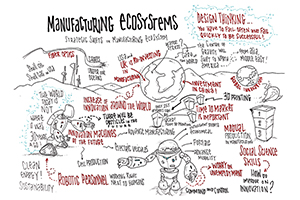Top Scientist
Fuchs Honored at World Economic Forum
By Chriss Swaney
 With concerns of slower global economic growth by prominent groups such as the International Monetary Fund (IMF), new manufacturing paradigms may be one important component to stimulating the economy.
With concerns of slower global economic growth by prominent groups such as the International Monetary Fund (IMF), new manufacturing paradigms may be one important component to stimulating the economy.
Erica Fuchs has studied global manufacturing ecosystems for a long time. At the recent summer World Economic Forum in China, Fuchs discussed some of the world's toughest economic issues with a cache of world thought leaders, including President Subra Suresh and Justine Cassell, the Charles M. Geschke Director of CMU's Human-Computer Interaction Institute, who serves as the head of the Global Agenda Council on Robotics and Smart Devices.
"Summer Davos provided an amazing opportunity to interact with world leaders and academic colleagues both on the implications of our research for their activities as well as the significance of their experiences for our future research," said Fuchs, an associate professor in the Department of Engineering and Public Policy who was honored as a "Top 40 Under 40" Scientist at Summer Davos.
"I am honored to have be nominated by Carnegie Mellon and subsequently selected by the World Economic Forum as a Young Scientist," said Fuchs, who participated in a panel session about the Strategic Shifts in the Manufacturing Ecosystem.
Other panel members included Su Bo, vice minister of industry and information technology of the People's Republic of China; Juergen Wild, chief executive officer of M+W Group, Germany; Lee Bowei, board chairman of LCY Chemical Corp of Taiwan; and Gerald E. Loeb, chief executive of U.S.-based Syntouch.
From microchips to manufacturing might, world governments continue to leave their marks on the global economy. But for a week this past September, Young Scientists at the World Economic Forum left their own marks on a new direction for world economics as they discussed the effect of location on the competitiveness of new technologies and the need to harness new technologies like 3D printing and the robotics generation. They also addressed the importance of energy and how the epicenter for new energy sources might shift from the Middle East to North America.
Fuchs and other forum participants discussed how the definition of manufacturing is changing and the role of robots in the future of manufacturing.
"The world is changing, and as researchers we need to help understand not only where manufacturing is going but also what human and technical components will, within that context, be essential to support economic growth and innovation across the diversity of nations globally," Fuchs said.
CMU is one of only 25 universities in the world - 11 in the U.S. - to be a member of the Forum's Global University Leaders Forum and President Suresh serves as CMU's representative.
Suresh participated in four sessions: Driving Smart Development; Fostering Innovation-Driven Entrepreneurship; Global Agenda on Science, Technology and Innovation: Setting Priorities; and Future of Universities: Role of Technology, Knowledge Creation, Values.
Cassell moderated a panel titled Strategic Shifts in the Digital Ecosystem and participated in Future of Universities.
More than a dozen of the participants at the China forum had CMU ties, including eight alumni - three of whom are trustees - and several parents of current or former students.
Online: Read more about CMU's involvement at www.cmu.edu/world-economic-forum/sessions/2013/
Pictured above, the discussion from the "Strategic Shifts in the Manufacturing Ecosystem" panel at the Summer World Economic Forum in China was captured in this artistic summary.
